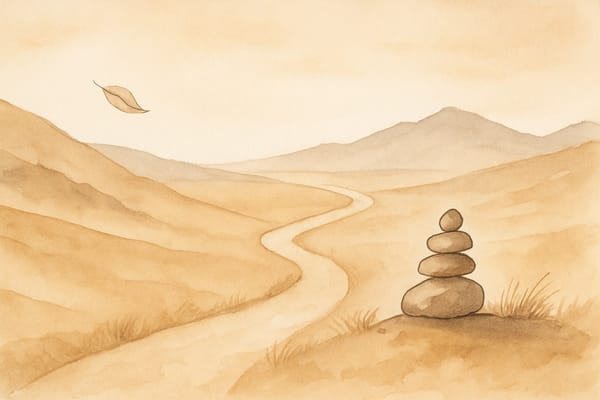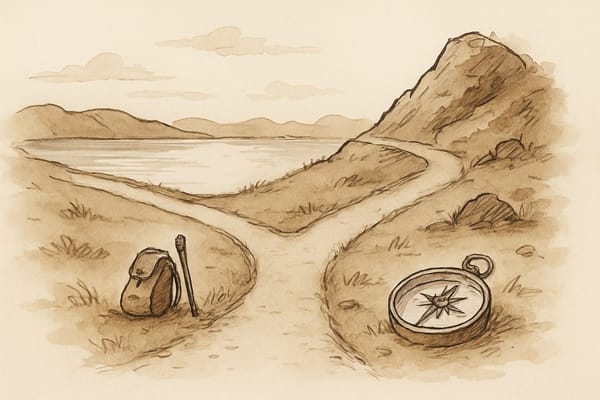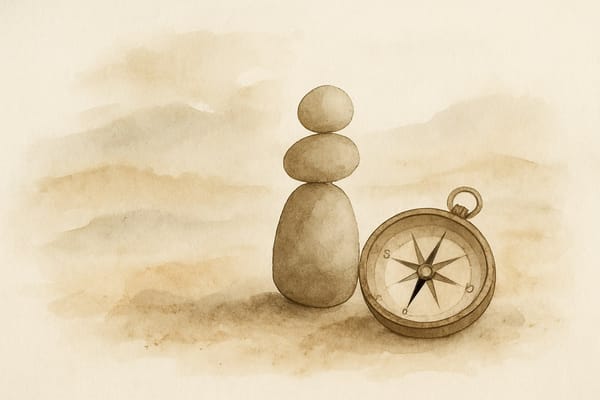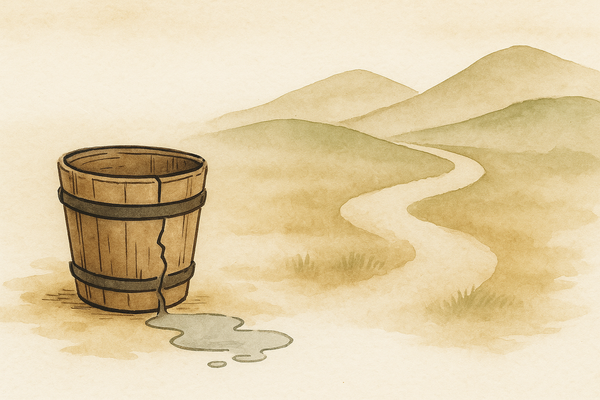W1. Unreasonability, Tranquility and Doubts
A banana pancake, a tough conversation, a missed run...this post explores how small choices reveal our value system, and whether doing good is better than feeling good.
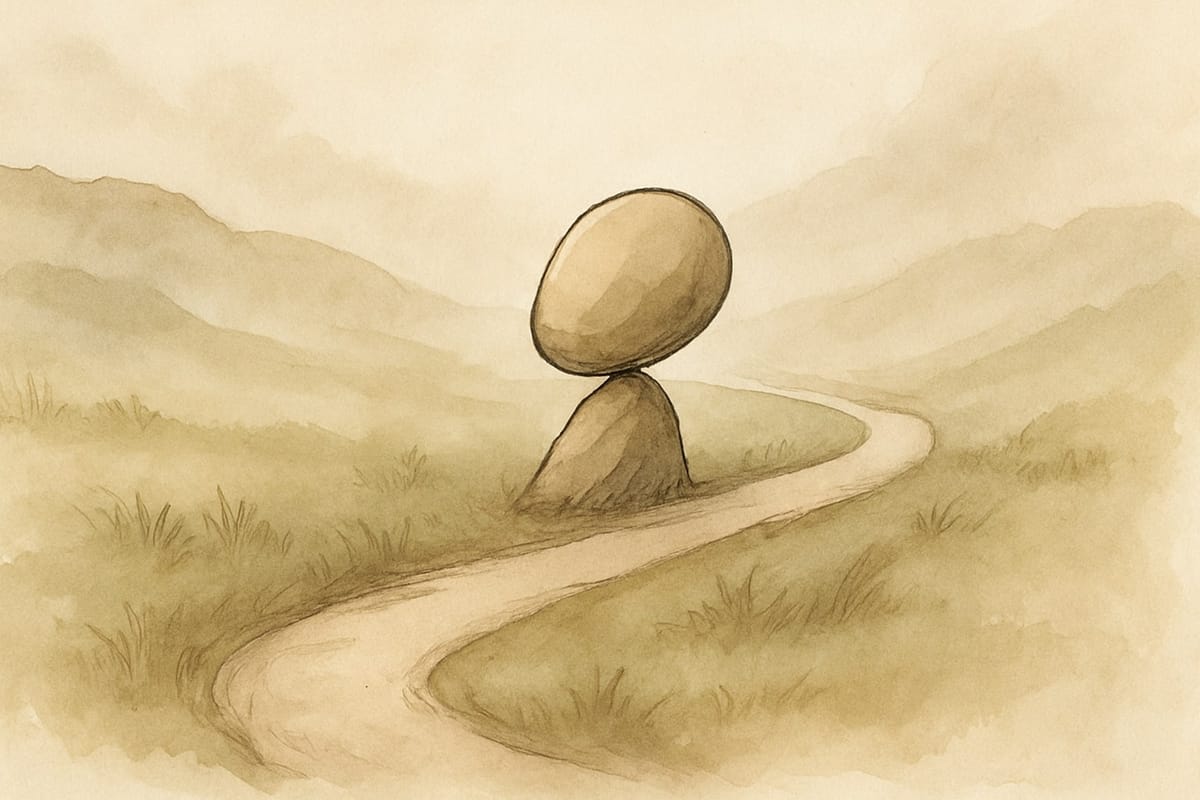
It’s 8:25 am, the air is slightly chilly and I’m sitting outside my rented house in Cyprus and contemplating my life as a Stoic.
I’m not used to writing, especially not by hand, but there’s something fulfilling about it. Like the pen is moving without me really knowing what to say next.
Value systems are an interesting thing...
When I wake up I prefer to have my breakfast as soon as possible and spend minimal time prepping.
But making banana pancakes takes some time, around 30 mins. And my partner likes to have fresh strawberries that are chopped up.
So why spend all this time on something as mundane as breakfast when the preference is just to be done with it?
I can only consider my value system.
What’s more important—having a solid breakfast in the belly that’ll last, or a fast one? What’s more important—reducing my prep time or doing something that makes my partner happy?
Considering what’s most valuable, the wisest option is obvious–but it's not the easiest option.
The Stoics would say what you find impressive in others is often the virtuous thing to do.
I’m not sure if it’s because I’m doing something virtuous that I feel fulfilled, or because I feel proud about doing something virtuous (putting my partner’s needs in front of my own).
Either way, it’s something so small and yet fulfilling.
Reflecting on that tiny event, the question becomes: would I rather have my preference or fulfillment?
Even so, there's no fulfillment to be guaranteed, it's just the best bet towards it.
Having a philosophy of life changes our value system and therefore how we behave in the world.
And to think we’re still talking about banana pancakes and strawberries…
Unreasonable beliefs
I recently found myself in an interesting conversation with a close friend of mine. While it’s difficult to pinpoint someone’s exact belief, our disagreement seemed to stem from the topics of trust and agency.
His view was (or at least my interpretation of it) that a man and a woman should not be alone in a room with each other as the risk of something going wrong is too great.
It’s not clear if this is a preferred position for everyone or just himself, in either case, it’s interesting that he still sees it as reasonable.
So how would we view this through a Stoic lens?
Since virtue (we could also call it your character) is the highest and only good — what does it say about his character if he would mistrust himself in such a situation? Most likely that he lacks basic self-control (virtue of moderation), however since I know him well, it’s highly unlikely to be his issue.
Let’s instead say that there’s a mistrust in the other person. She might do something and then blame him for it—resulting in the loss of his friend (as his friend is more likely to believe his partner).
Is it still a reasonable position to have?
In my opinion, no.
He believes the potential consequences of the situation have a higher value than his intentions.
Since only the latter is fully within his control—and the one thing he can be held responsible for—he’s making an error of judgment.
He could claim that his intention is to prevent anything bad from happening, but he’d still be doing so by making assumptions on behalf of the other person without being given a good reason to do so.
There may be a history of bad things happening before—but if there’s certainly a much bigger history of it never having happened, making the judgment unreasonable.
A better option (more reasonable) would be to continue the conversation as it was, and should the consequences he fears ever arise, to handle it virtuously.
Otherwise, it'd be like denying ourselves of food in fear of food poisoning. It’s not that it doesn’t happen, it’s simply unreasonable to be on constant guard from it (that might wisely need more of the virtue of Courage).
The right thing to do from a Stoic perspective is to treat the other person fairly, and have the courage to do so.
Virtue vs Tranquility
There’s this interesting view on life that I’ll sometimes ping-pong in my head.
For over 10 years I would meditate every day to feel better, and that was the goal itself.
In Zen Buddhism, the goal of tranquility and liberation is similar (if we take the secular approach).
But what gets me is how self-centered the philosophy is, which is ironic since the goal is often to shed the “self.”
I’m simplifying and generalizing here, but there’s something interesting about having a philosophy designed towards one’s own tranquility without concepts of justice or how we influence others and make the world a better place being the central good.
Not unlike the Epicureans, or William B. Irvine — the modern Stoicism popularizer who translated virtue into tranquility and made that the highest good.
But if virtue didn’t lead to eudaimonia (or be intrinsic to it), would we still value it?
In this respect Stoicism seems as self-centered as Buddhism, the difference being the way they reach their goals.
For Stoics — action is key and an expression of virtue.
For Buddhists — inaction and neutrality can be just as valuable as action.
So what’s the end-game here?
For Stoics it would be to become the Sage — someone whose actions are always perfectly virtuous (an impossible ideal, but something to strive towards), to live in eudaimonia.
For William B. Irvine it would be to constantly experience tranquility.
And for secular Buddhists, it’d be enlightenment — to shed the self and live in a state (or at least understanding) of non-duality, freedom from reactive emotions.
So to apply the different mindsets to a basic everyday scenario:
I was originally planning on going for a run this morning before breakfast. I am a fitness junkie and it’s a nice way to start the day ahead of breakfast.
My partner has a thesis opposition this morning that she’s nervous about, so I decided to change my morning plan to make her coffee and breakfast instead, to help her.
And this was fulfilling — and I’m glad and proud that I did.
But from William’s perspective I should have focused on what gives me the most tranquility (and that’d have been to stick to my routine).
From a Buddhist’s point of view I think it may also have been the latter.
How we view life and what we set as the highest good matters.
It makes drastic changes in our actions — and over time, that adds up.
Doubts
Yesterday I found myself in a familiar pattern.
Something came up at work that I felt tremendous resistance t0, but then through Stoicism–I knew what needed to be done was done.
This unfortunately didn’t just result in me doing the thing, it instead made me question virtue as the highest good and our goal.
I went for a run and started wondering: is tranquility perhaps a better goal than virtue?
Listening to William B. Irvine’s audiobook A Guide to the Good Life — which I’ve probably listened through 3 or 4 times.
When things calmed down and my rational capacity began to reset itself, it became clear that the detour of tranquility isn’t a sustainable philosophy of life.
Surely there’s as much if not more value in doing good compared to just feeling good?
At any rate, this type of detour has become commonplace for me.
I believe it stems from 2 reasons:
- Emotions taking over and clouding my rational capacity. This will always happen to some degree, but practices to keep the volatile emotions calm and stay on track may be a good addition. This also ties into the second point.
- Lack of faith that virtue leads to eudaimonia.When emotions spiral there’s a strong need to feel good and stable.At this point, I don’t know if virtue leads to feeling good. Sometimes, sure. But reliably? I’m not quite as sure.
An important point I need to remember is that doing good doesn’t always lead to feeling good.
But nothing reliably leads to feeling good.
With doing good, at least we can take pride and comfort in knowing that we’re doing the best we can—like an investment.
The stocks always go down, but as long as you’re consistently investing, you’ll get to ride the highs too — that's fulfillment!
It seems to me some sort of emotional regulation practice is likely to benefit me.
I’ll look one up and start making a routine out of it.


